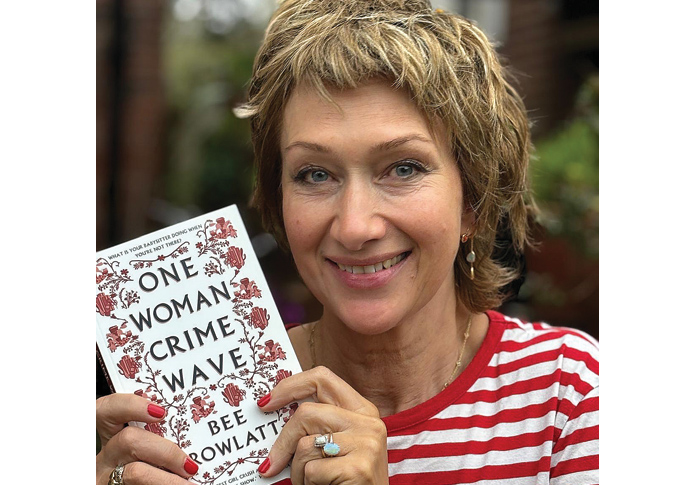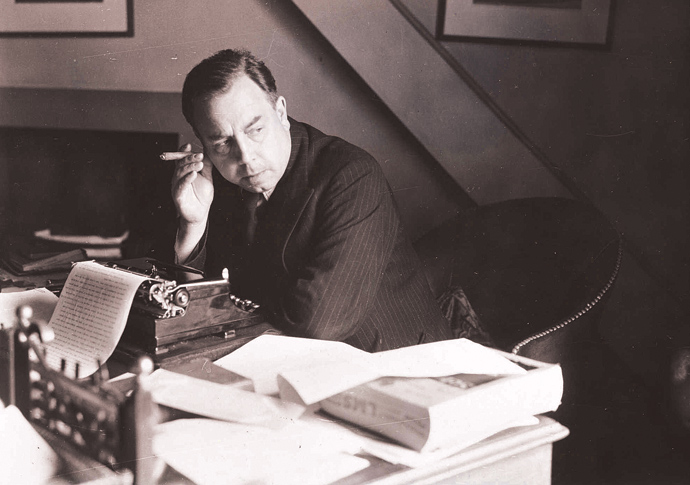JB Priestley pictured in his office in 1940
AS Inspector Goole leaves the Birling household in JB Priestley’s An Inspector Calls, he turns to those assembled.
“Remember this,” he decries. “We don’t live alone. We are members of one body. We are responsible for each other. And I tell you that the time will soon come when, if men will not learn that lesson, then they will be taught it in fire and blood and anguish.”
The playwright, novelist and broadcaster poured everything he could into the work to warn that Britain must not, after the Second World War, go back to the vast inequalities of the 1930s.
And for author Bee Rowlatt, who will be speaking about her new book One Woman Crime Wave at the Owl bookshop next week, Priestley’s work has a special resonance.
She has drawn on An Inspector Calls for her story. It tells of babysitter Ashleigh who looks after the offspring of well-heeled NW5 types and discovers secrets that lie behind the Farrow & Ball facades.
Bee’s previous work includes a 20-year stint on the World Service, her non-fiction Travels With Mary about Mary Wollstonecraft, and organising a permanent celebration of the feminist author in Newington Green.
Now based at the British Library, Bee runs a Wollstonecraft charity that provides schools and educationists with information about the growth of human rights.
“When Priestley was writing An Inspector Calls he was writing about issues he cared deeply about,” she says.
“He recognised the staggering inequality of the 1930s and 40s. He was key in the post-war settlement that set up the Welfare State. He contributed to a society that offered fairness, chances and mobility.
“And we have lost that today. We have galloped in the wrong direction.”
The poster for the 1954 film version of An Inspector Calls starring Alastair Sim
Priestley’s ability to speak to a wide audience about social conditions – and why we live the way we do by using recognisable characters – was an inspiration.
“An Inspector Calls had a revival at the National Theatre in 2016 and I fell back in love with it. It is a book you can talk to everyone about. It is democratically accessible,” she adds.
“Priestley speaks to a world that is here today. He wrote it at the end of this catastrophic event. He applied acute hindsight to consider how we had got to where we were, how we treat each other.”
Her fascination with Priestley follows on from her work on Wollstonecraft – both authors focused on social issues. But Bee’s background in journalism made the novel a departure.
“I had never written fiction before, but the connection is the power of the written word to influence people in different ways,” she says.
In An Inspector Calls, Inspector Goole is investigating the death of Eva Smith. In Bee’s book the protagonist, Ashleigh, plays a similarly illustrative role.
“I was a very nosey babysitter,” she says. “It can be a tense relationship. For parents, there is a time when childcare is the be-all and end-all. Sometimes you do not really know who is in your home and looking after your kids. And you feel conflicted about handing your children over.”
Writing Ashleigh was helped by drawing on her daughters for phrases and thoughts. But while writing fiction was at first “like making a sculpture out of jelly,” she enjoyed creating her.
“I love Ashleigh,” she admits. “She is very badly behaved. She is experiencing rage when she realises the privilege around her and she knows what it is.
“She is both powerful and vulnerable. And I like troublemaking people. You sometimes need to make trouble to get things done.”
Bee brings a searching eye to life in NW5: it’s a world of Ottolenghi dishes, Le Creuset pans and gut health books lining artfully designed shelves, and where casual sexism and racism disguises itself as hard-edged intellectual probing of “PC” culture.
With this backdrop, we meet Ashleigh as she explores the homes of her wealthy employers.
Ashleigh is curious and takes on the role of detective – “careful to note and memorise” – everything about the lives she is being paid to be a servile part of.

Bee Rowlatt
Ashleigh lives in the same neighbourhood but in very different circumstances, her home a cramped flat on a council estate. That she babysits in a large Victorian house that was once flats – and where she once lived – is a plot tool illustrating the changing nature of a community since the Right to Buy came in.
Rummaging through bathrooms, she uncovers the secrets that pull back a manicured middle-class aesthetic. These are people who need cream for their piles and who have hair where the industrial beauty markets do not want it. She finds “the honesty of bodies” levelling.
Ashleigh is a witness to the ordinariness of those whose money is the only thing that sets them apart.
Set in 2012, the London Olympics offers a further metaphor: Danny Boyle’s opening ceremony gave us a sense of a coherent modern British identity marked by tolerance and respect. Bee uncovers the shaky ground on which this was founded, capturing the many subtle and pervasive ways that class, sex and race divide.
NW5 mum Tara is a blistering creation, a victim of circumstances who resides in a carnivalesque world of privileged nastiness, vapidity and petty intrigue, in which people vent professional, sexual and personal frustrations on those less fortunate.
“I wanted people to feel for her – but she has monstrous qualities,” she adds.
Bee circles back to questions of criminality and victimhood, vexing a binary the book suggests we would do well to interrogate.
This, like Priestley’s work, is a warning: London is rich for its diversity and a London that is socially cleansed isn’t a city at all. A London where money dictates who can stay and play and who can only be transitory, coming daily for work but only as part of the domestic service for the city dwellers, has failed.
• One Woman Crime Wave. By Bee Rowlatt. Renard Press Ltd, £10
• Bee Rowlatt discusses her book in conversation with Stephanie Cross at 6.30pm on June 19 at the Owl Bookshop in Kentish Town, £6. To book visit: https://dauntbooks.co.uk/shop/events/bee-rowlatt/




